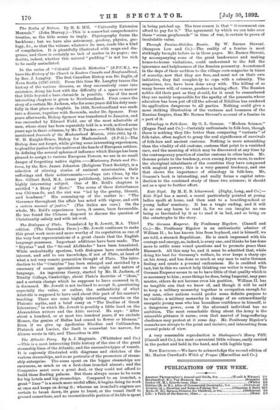In the series of "Colonial Church Histories" (S.P.C.K.), we have
the History of the Church in Eastern Canada and Newfoundland, by Rev. J. Langtry. The first Canadian Bishop was Dr. Inglis, of Nova Scotia (1787-1816). From this time Mr. Langtry traces the history of the various dioceses, as they successively came into existence, doing his best with the difficulty of a space so narrow that little beyond a bare chronicle is possible. One of the most interesting chapters is given to Newfoundland. First comes the story of a certain Mr. Jackson, who for some years did his duty man- fully in that place as chaplain. In 1839, Newfoundland was made into a diocese, together with Bermuda, under Dr. Spencer. Four years afterwards, Bishop Spencer was transferred to Jamaica, and was succeeded by Edward Field, one of the most admirable of men, whose story has been separately told in a work, noticed some years ago in these columns, by Mr. T. Tucker.—With this may be mentioned Journals of the Mashonalanel Mission, 1888-1892, by G. W. H. Knight-Bruce, Bishop for Mashonaland. (S.P.G.)—The Bishop does not forget, while giving some interesting experiences, to plead for justice for the natives at the hands of European settlers. In defining the several spheres of influence which Europe has been pleased to assign to various European Powers, we are in no small danger of forgetting native rights.—Missionary Points and Pic- tures, by the Rev. James Johnston (Religious Tract Society), is a selection of stirring stories of eminent missionaries, their sufferings and their achievements.—Peeps into China, by the Rev. Gilbert Reid, MA. (same publishers), introduces us to a highly interesting subject. One of Mr. Reid's chapters is entitled "A Story of Riots." The scene of these disturbances was Chi-nan-fu, and the riot was "led by the gentry, literati, and headmen." His summing-up of the matter is : "The Governor throughout the affair has acted with vigour, and with a certain amount of justice." (The italics are ours.) On the whole, Mr. Reid's experiences have, it seems, been favourable. He has found the Chinese disposed to discuss the question of Christianity calmly and with interest.


































 Previous page
Previous page